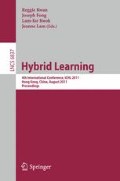Abstract
Computer supported instruction can easily facilitate different learning environments, different teaching models and learning styles. In hybrid learning environment, the teachers face a big challenge to find the suitable teaching strategies for a specific content. In this study, three experiments were conducted to explore the different math teaching strategies for different contents and different characteristics of the students in hybrid learning environment. The results indicated that traditional teaching was more suitable for the algebra related topics. Computer supported hybrid teaching was more effective for the graph related topics. Towards different students’ characteristics, medium and low performance students benefited more from the computer supported hybrid teaching. The traditional teaching was more suitable for the high performance students. The student-centered hybrid learning requested significant more teaching hours to facilitate effective learning results.
Access this chapter
Tax calculation will be finalised at checkout
Purchases are for personal use only
Preview
Unable to display preview. Download preview PDF.
References
Graham, C.R.: Blended learning systems: definition, current trends, and future directions. In: Bonk, C.J., Graham, C.R. (eds.) Handbook of Blended Learning: Global Perspectives, Local Designs, pp. 21–33. Pfeiffer Publishing, San Francisco (2006)
Heinze, A., Procter, C.: Reflections on the Use of Blended Learning. Education in a Changing Environment. University of Salford, Salford, Education Development Unit (2004)
Zhang, L.M., Ho., P.K.: A Case Study on the Necessity of the Teaching Method Design Associated with CAI Implementation in Mathematics Teaching. In: Proceedings of the World Conference on Educational Multimedia, Hypermedia & Telecommunication, Florida, USA, June 26-30 (2006)
Wai, F.L.: DM_Lab and experimental geometry instruction. Macao Foundation, Macao (2002)
Sweller, J.: Cognitive load during problem solving: Effects on learning. Cognitive Science 12, 257–285 (1988)
Sweller, J., van Merrienboer, J.G., Paas, F.: Cognitive architecture and instructional design. Educational Psychology Review 10(3), 251–296 (1998)
Kalyuga, S., Ayres, P., Chandler, P., Sweller, J.: The Expertise Reversal Effect. Educational Psychologist 38(1), 23–31 (2003)
Kirschner, P.A.: Cognitive load theory: implications of cognitive load theory on the design of learning. Learning and Instruction 12, 1–10 (2002)
NASA-TLX. Task Load Index, http://humansystems.arc.nasa.gov/groups/TLX/ (retrieved on February 7, 2011)
van Gog, T., Pass, F.: Instructional efficiency: revisiting the original construct in educational research. Educational Psychologist 43(1), 16–26 (2008)
Paas, F.: Training strategies for attaining transfer of problem-solving skill in statistics: A cognitive load approach. Journal of Educational Psychology 84, 429–434 (1992)
Ouyang, S.Y., Zhang, L.M., Chan, N.H.: A Study on Effectiveness and Cognitive Load of Secondary Math Teaching Using Dynamic Geometry Software PG_Lab. In: Proceedings of International Conference on Information and Communication Technologies in Education (ICICTE 2009), Corfu, Greece, July 9-11 (2009)
Zhang, L.M., Chan, N.H., Chu, Y.L.: Cognitive Load Theory Based Effectiveness Evaluation on Dynamic Math Teaching. In: Tsang, P., Cheung, S.K.S., Lee, V.S.K., Huang, R. (eds.) ICHL 2010. LNCS, vol. 6248, pp. 427–438. Springer, Heidelberg (2010)
Author information
Authors and Affiliations
Editor information
Editors and Affiliations
Rights and permissions
Copyright information
© 2011 Springer-Verlag Berlin Heidelberg
About this paper
Cite this paper
Zhang, L., Jiao, J. (2011). A Study on Effective Math Teaching Strategy Design in Hybrid Learning Environment. In: Kwan, R., Fong, J., Kwok, Lf., Lam, J. (eds) Hybrid Learning. ICHL 2011. Lecture Notes in Computer Science, vol 6837. Springer, Berlin, Heidelberg. https://doi.org/10.1007/978-3-642-22763-9_20
Download citation
DOI: https://doi.org/10.1007/978-3-642-22763-9_20
Publisher Name: Springer, Berlin, Heidelberg
Print ISBN: 978-3-642-22762-2
Online ISBN: 978-3-642-22763-9
eBook Packages: Computer ScienceComputer Science (R0)

